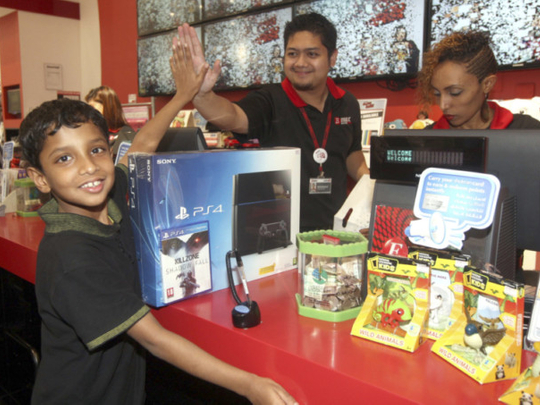
When Ask.com, the online question answering service, did a survey last year, the majority of its 2,000 global respondents said “friendly” is the single most important aspect of customer service. The poll saw 48 per cent of consumers ranked friendliness of staff as the main attributes of customer service, followed by level of knowledge, picked by 41 per cent.
In a larger study, Accenture surveyed 13,168 consumers in 33 countries in July last year asking respondents to evaluate ten industry sectors. The Accenture 2013 Global Consumer Pulse Survey found that the biggest frustrations with customer service are common around the world: having to contact a company multiple times for the same reason, having to repeat the same information, long hold times, and significantly, dealing with unfriendly employees.
Positive starting point
At a rudimentary level, great customer service is about making customers happy enough to return and to pass on positive feedback. But it is evident that the friendliness factor can colour the spectrum of customer interfaces — from first contact to the rewarding of long-term loyalty.
The London-based Institute of Customer Service emphasises the importance of first contact in its March report, Can Customer Service Create Trust? “A customer’s first contact with an organisation — whether in person, over the phone or through an online application — is critical to establishing a relationship based on trust.
Organisations should therefore continually re-evaluate how easy they are to do business with,” the report says. In its contemporaneous research into complaints, Handle with Care: An Analysis and Toolkit to Improve Complaint Handling, it stresses that the customer experience at first point of contact is especially relevant when the customer has a problem. “The reaction a customer gets when they report a problem or complaint has a significant bearing on their satisfaction, whatever the final outcome of the complaint.”
Impact of a warm welcome
In Dubai this year, the Department of Economic Development (DED) studied the impact of Service With A Smile in a novel venture across the emirate’s retail sector. Predictably, complaint resolution was the strongest factor that propelled coffee shops into the top spot of this survey, with an aggregate score of 70 out of 100. All seven coffee shops that were evaluated won full points in the complaints criterion, with an average consumer rating of 40.07 out of 60.
The DED’s qualitative analysis of consumer experiences in key business sectors rated Dubai’s coffee shops at the highest rung, while hypermarkets came in second, followed by apparel, electronics, furniture, and car agency sectors. Local consumers evaluated service quality, billing transparency, sharing of warranty information by salespersons, and overall satisfaction.
These elements can work in isolation and inclusion to evoke friendliness.
Commenting on LuLu Hypermarket winning the Best Consumer Friendly Retailer Award in the hypermarket category at the Consumer Friendliness Index 2013, Omar Bushahab, CEO, Commercial Compliance And Consumer Protection at the DED, says, “Nearly 94 per cent of customers who shop at LuLu expressed happiness over billing transparency.”
Around the globe, the top two frustrations in the buying and billing phase of customer experience are a company promising one thing but delivering another, and distrusting how a company treats personal information, Accenture observes.
Customers cherish companies that treat them nicely, and will apparently pay more to obtain these services. Industry statistics show that when a customer receives good service, he or she tells up to 12 people on average, but when a customer receives poor service, he or she tells up to 20 people. A staggering 98 per cent of customer interactions are faster and more efficient when the company takes the time to establish friendship with the customer.
Being customer-friendly is a humongous and continuous task — from handling a phone call efficiently to maintaining efficient communications, resolving complaints and providing convenient solutions — and organisations in the UAE are rallying to the call.
Juma Al Majid Automobiles took the top spot in the Consumer Friendliness Index 2013, in both the overall rating and the automobiles category. Khalid Eisa, COO, Juma Al Majid Group, attributed this to the company’s vision since 1950 — to satisfy customers and maintain a good reputation. “Fair prices, quick resolution of complaints, and our well-trained sales team are the main factors behind this high rating,” he says.
Earlier in the year, telecom operator Etisalat received the ICT Development Customer Care Excellence Award from Middle East Excellence Awards Institute for its extraordinary role in promoting smart customer service across the country. Hassan Hussain, Vice-President, Customer Care, Etisalat UAE, explains that smart customer service equalled customer-friendly service: “This award is a testament to our track record of innovation and harnessing technology, for the maximum benefit of our customers.”
Abu Dhabi Police is planning to install its Sahel e-payment machines at government and private companies in a bid to save time and effort for thousands of customers. Col. Anwar Abdullah Al Mulla, Head of Information and Communication Technology Department, Abu Dhabi Police, said last month that it is a part of providing outstanding services. “The machine is characterised by speed, accuracy, and ease of processing vehicle registrations, fine payments, and replacements for lost or damaged registration cards — in less than two minutes,” he explained.
Companies across different industries are realising that improving the people experience goes a long way, even in remote or non-customer-facing functions such as supply chain and research.
PwC’s 17th Annual Global CEO Survey 2014 gauges that the next few years will see CEOs leading their organisations towards a new kind of interaction with customers, shifting the focus away from stand-alone transactions to a more sustainable always-on relationship. The report was based on 1,344 interviews with CEOs in 68 countries conducted last year. “Every target customer segment has its own experiential, behavioural and attitudinal value set, or its own distinctive experience recipe. Understanding this recipe helps predict customers’ willingness to pay for attributes such as quality and customer service and willingness to stay loyal to the brand.” (See table.)
“This means really understanding who your target customer is and giving her what she values most throughout her evolving customer journey,” it adds. Bob Thompson, Author, CEO of CustomerThink Corp, and Director at Customer Experience Professionals Association, tapers it to another task for CEOs. He says staff must be hired for their friendliness, and then trained for knowledge: “Why? As some have put it more colourfully: You can’t train people to be nice.”












